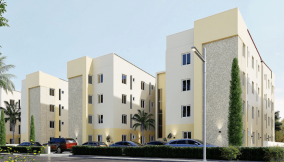The global real estate space has enjoyed a torrent of investments over the years, with funding for commercial real estate rising to a whopping USD 1.3 trillion in 2021. This represents about 55 percent increase in the 2020 levels.
Tilden, a real estate development firm, explains that with radical growth arises the need for expansion and sophistication, resulting in the demand for a robust alignment between technology and the sector to scale up the sector and help remove the barriers inhibiting its growth.
Ugo Obi, an official of the company, explains further that technology deployment in the property space is known as ‘real estate technology,’ adding that it encapsulates varying property technologies such as smart home setups, virtual reality, artificial intelligence, big data analytics, asset management software, cloud integration, and several other tools.
Obi, whose company aims to harness investments in the real estate sector through innovative residential, hospitality and commercial developments, noted that the Nigerian real estate industry is one of many to have embraced technology, especially in property evaluation, development of online marketplaces, smart homes, prospecting, and marketing.
Looking into the future for what it holds for tech-real estate integrations in Nigeria, he listed some of the tech implementations transforming the property industry in Nigeria, including:
Real estate marketplace software:
The most extensive adoption of technology in the Nigerian real estate industry is the development of marketplace software and listing platforms, ensuring buyers and sellers can function more efficiently.
Before the advent of marketplaces, it was business as usual, where a person interested in renting, leasing, or buying real estate would have to meet with an agent in person to assess the property.
“Now, with a few clicks on your phone’s screen, you can access thousands of homes, shops, and more. These platforms also offer chat features that enable buyers and sellers to communicate directly without third-party interference,” Obi said.
Virtual property inspection:
Virtual property inspection started off as a temporary fix during the global COVID-19 pandemic and has metamorphozed into an integral and interactive asset in the global real estate market. Inspection is top of the to-do list when negotiating, leasing, or buying a property.
A virtual inspection is a more convenient and cheaper alternative than traditional approaches. It provides clients with an immersive experience of the features of a particular home or building without spending valuable time and money on physical inspection.
Obi noted that, although still a developing phenomenon in the Nigerian market, virtual inspection could redefine consumer experiences, build trust in the ecosystem and improve the accuracy of property information shared with the audience.
Smart home technology:
He pointed out that the adoption of smart home technology is also steadily becoming prominent in Nigeria, especially in luxury residential and commercial spaces across the nation.
“A typical smart home or office offers convenience, remote control, customization, energy efficiency, flexibility, security, and future-proof features,” he said, adding that, in terms of valuation, one would expect a smart home to attract more investment compared to a traditional home, and rightfully so.
“There is no doubt that Tech integration in real estate development drives up the value of any property. Although the trend of automation and convenience is still relatively new in Nigeria and slackened by the limited access to broadband internet, it is poised to revolutionize the real estate industry in the coming years,” Obi assured.
Join BusinessDay whatsapp Channel, to stay up to date
Open In Whatsapp





